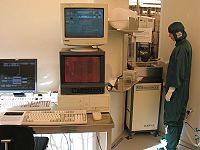Specific Process Knowledge/Thin film deposition/PECVD: Difference between revisions
No edit summary |
|||
| Line 87: | Line 87: | ||
|- | |- | ||
|style="background:silver; color:black"| | |style="background:silver; color:black"| | ||
| style="background:LightGrey; color:black"|Material allowed on the substrate | |||
|style="background:WhiteSmoke; color:black"| | |||
*Aluminium | |||
*All metals < 5% of the substrate coverage (ONLY PECVD3!) | |||
|- | |||
|} | |||
{| border="2" cellspacing="0" cellpadding="10" | |||
|- | |||
!style="background:silver; color:black;" align="left"|Purpose | |||
|style="background:LightGrey; color:black"|Deposition of dielectrica | |||
|style="background:WhiteSmoke; color:black"| | |||
*Silicon oxide | |||
*Silicon nitride | |||
*Silicon oxynitride | |||
*PBSG (Phosphorous Boron doped Silica Glass) | |||
*Silicon oxide doped with Germanium | |||
|- | |||
!style="background:silver; color:black" align="left" rowspan="4"|Performance | |||
|style="background:LightGrey; color:black"|Film thickness | |||
|style="background:WhiteSmoke; color:black"| | |||
*~10nm - 30µm | |||
|- | |||
|style="background:LightGrey; color:black"|Index of refraction | |||
|style="background:WhiteSmoke; color:black"| | |||
*~1.4-2.1 | |||
|- | |||
|style="background:LightGrey; color:black"|Step coverage | |||
|style="background:WhiteSmoke; color:black"| | |||
*In general: Not so good | |||
*PBSG: Floats at 1000<sup>o</sup>C | |||
|- | |||
|style="background:LightGrey; color:black"|Film quality | |||
|style="background:WhiteSmoke; color:black"| | |||
*Not so dense film | |||
*Hydrogen will be incorporated in the films | |||
|- | |||
!style="background:silver; color:black" align="left"rowspan="3" |Process parameter range | |||
|style="background:LightGrey; color:black"|Process Temperature | |||
|style="background:WhiteSmoke; color:black"| | |||
*300 <sup>o</sup>C | |||
|- | |||
|style="background:LightGrey; color:black"|Process pressure | |||
|style="background:WhiteSmoke; color:black"| | |||
*~200-900 mTorr | |||
|- | |||
|style="background:LightGrey; color:black"|Gas flows | |||
|style="background:WhiteSmoke; color:black"| | |||
*SiH<math>_4</math>:0-60 sccm | |||
*N<math>_2</math>O:0-3000 sccm | |||
*NH<math>_3</math>:0-1000 sccm | |||
*N<math>_2</math>:0-3000 sccm | |||
*GeH<math>_4</math>:0-6.00 sccm | |||
*5%PH<math>_3</math>:0-99 sccm | |||
*5%B<math>_2</math>H<math>_6</math>:0-1000 sccm | |||
|- | |||
!style="background:silver; color:black" align="left"rowspan="3"|Substrates | |||
|style="background:LightGrey; color:black"|Batch size | |||
|style="background:WhiteSmoke; color:black"| | |||
*1-3 4" wafer per run | |||
*1 6" wafer per run | |||
*Or several smaler pieces | |||
*Deposition on one side of the substrate | |||
|- | |||
| style="background:LightGrey; color:black"|Substrate material allowed | |||
|style="background:WhiteSmoke; color:black"| | |||
*Silicon wafers | |||
**with layers of silicon oxide or silicon (oxy)nitride | |||
*Quartz wafers | |||
|- | |||
| style="background:LightGrey; color:black"|Material allowed on the substrate | | style="background:LightGrey; color:black"|Material allowed on the substrate | ||
|style="background:WhiteSmoke; color:black"| | |style="background:WhiteSmoke; color:black"| | ||
Revision as of 14:25, 7 May 2008
PECVD Plasma Enhanced Chemical Vapor Deposition


We have three PECVD's here at DANCHIP. They can all be used to deposit Silicon oxides and Silicon nitrides with or without dopants of Boron, Phosphorus and Germanium. PECVD1 and PECVD3 are used for silicon based processing where as PECVD2 is dedicated deposition on III-V materials. PECVD1 is the cleanest system where as PECVD3 is allowed to use with substrates with small abouts of metal on. See the precise rules in the equipment manuals which are uploaded in LabManager.
PECVD is a chemical vapor deposition process that applies a plasma to enhance chemical reaction rates of reactive spices. PECVD processing allows deposition at lower temperatures, which is often critical in the manufacture of semiconductors.
All though PECVD1, 2 and 3 are very similar you should not expect to transfer a recipe between the systems and get the same exact same result.
Recipes on PECVD1 and PECVD3
- Recipes on PECVD1 for deposition of silicon oxides
- Recipes on PECVD1 for deposition of silicon nitride and silicon oxynitride
- Recipes on PECVD3 for deposition of silicon oxides
- Recipes on PECVD3 for deposition of silicon nitride and silicon oxynitride
| Purpose | Deposition of dielectrica |
|
|---|---|---|
| Performance | Film thickness |
|
| Index of refraction |
| |
| Step coverage |
| |
| Film quality |
| |
| Process parameter range | Process Temperature |
|
| Process pressure |
| |
| Gas flows |
| |
| Substrates | Batch size |
|
| Substrate material allowed |
| |
| Material allowed on the substrate |
|
| Purpose | Deposition of dielectrica |
|
|---|---|---|
| Performance | Film thickness |
|
| Index of refraction |
| |
| Step coverage |
| |
| Film quality |
| |
| Process parameter range | Process Temperature |
|
| Process pressure |
| |
| Gas flows |
| |
| Substrates | Batch size |
|
| Substrate material allowed |
| |
| Material allowed on the substrate |
|




